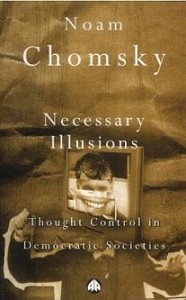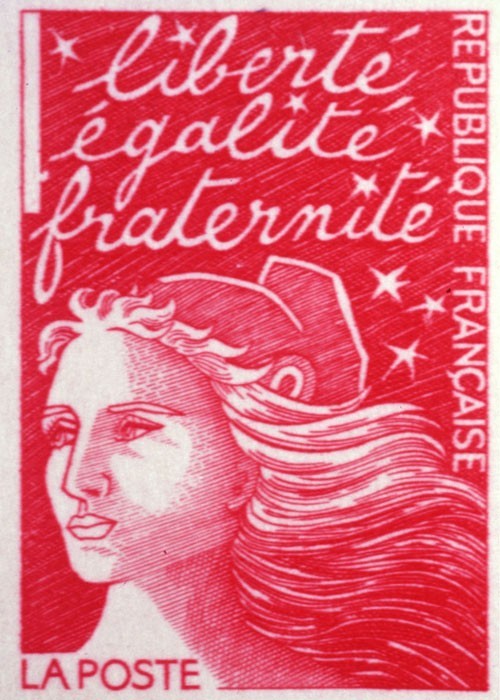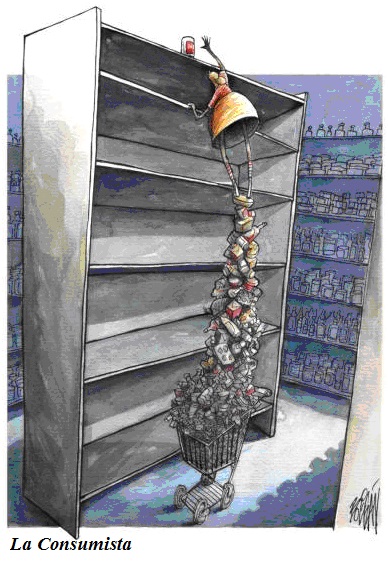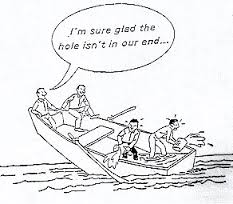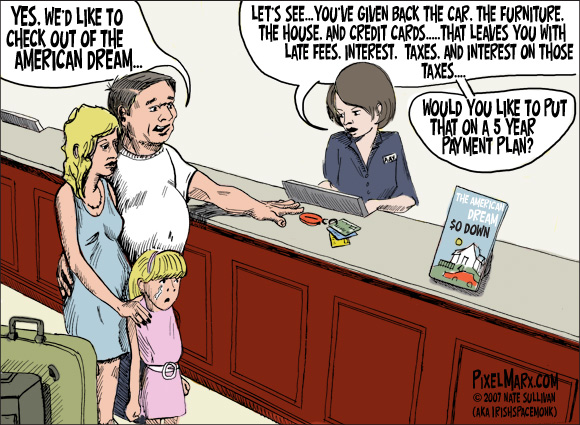« Locked In: The Paradox of Capitalism | Home | What is Fascism? »
The Alchemy of Language in the Pacification of the American People
By Karl North | July 14, 2014
Orwell’s term “doublethink”[1], the use of language to create a false picture of reality, has spawned a large literature, but that exposure has not stopped powerful interests from inventing new ways to use the capacity of language to control thought.
Something primed me many years ago to automatically search for the camouflage, innuendo, and outright misrepresentation of meaning that appears to be a subtext of much use of language. I can only guess at the possible influences: formal education in anthropology and linguistics in early life, fluency in a couple of foreign languages and brave stabs at a few others, a brief acquaintance with later Chomsky protégé and political framing[2] analyst George Lakoff (also in graduate school), my eventual assimilation of the great Chomsky’s analysis[3] of the “manufacture of consent”, and perhaps most of all, the effects of coming of age politically in the upheavals of the 1960s.
It no longer takes much to disrobe the most innocent-sounding terms, once one is willing to examine them critically. As illusions fall away, they create a snowball effect by provoking questions about the official narratives in other areas of life. Calling the medical industrial syndicate in the US ‘health care’, for example, when much of it is so obviously nothing but an expensive treatment racket. Or, speaking of ‘the Western Democracies’ as our media incessantly do, when there is obviously no regime anywhere on the globe that fulfills the demands of “by the people, for the people, of the people”, or is even structured so that it might potentially do so. Louis Brandeis, the first Jewish judge on the US Supreme Court, said it in a nutshell: a society can have the wealth in few hands, or it can have democracy; it cannot have both. By this measure, most societies have no chance at a real democracy that works.
So from my vantage point, the success of semantic trickery, now combined with powerful graphics and video, to create a nation of consumers addicted to chewing our way pell-mell through first our own raw materials, then those plundered from other nations, never ceases to fascinate. That was just the beginning of the achievements of ‘public relations’. Amidst the new era of global degrowth due to the end of cheap energy, which is causing increasing suffering and revolts against oligarchic regimes worldwide, the power of language has succeeded in this country in making us the most pacified people on the planet. How does this happen?
The Myth of Absolute Freedom
Since the beginning of the republic, US elites have found in the language of freedom a magnificent weapon of mass deception. “Let Freedom Ring!” the siren song sang out. Pandering to both libertarian Republicans and liberal Democrats, the powers that be offered different conceptions of what ‘free’ means, all of which on deeper analysis ring hollow. ‘Free speech’, ‘free press’, ‘free elections’, ‘free enterprise’, ‘free competition’, ‘free market’, ‘free trade’, ‘free world’ and the like were all peddled to a population that got only a show window view, a shallow misrepresentation of how these policies work out over time in a society where from the outset wealth and power have been concentrated in few hands. As in The Emperor’s New Clothes folktale[4], it is time to defrock and to deconstruct this language in the light of what has happened historically in our society in the guise of freedom.
What does a closer look at freedom in our society reveal? The main deceptive device in the language of freedom is to focus on individual freedom in the short run and to hide the inevitable consequences over time in which a few that have the means, unless thwarted, capture the means to control the lives of the many. Thus unrestricted freedom ends in loss of freedom. Speech that functions properly to promote the public good turns out to be not free but expensive, and thus becomes the privilege of the wealthy minority who use it to indoctrinate the rest of us. Enterprise appears free until one’s enterprise is subjected to the inevitable hostile takeover by the powerful interests that exert monopoly power in most sectors of our so-called free market economy. Trade is not usually free, but favors the more powerful, imperial player, and so locks lesser economies into underdevelopment. Elections are not free but won by the candidate with the most funding. Academics, particularly in the applied sciences, know well that the price of academic freedom to criticize corporate power is institutional marginalization and the end of funding for their research.
The Ideology of Political Freedom
The success of ‘freedom’ as a weapon of mass deception manifests itself in different ways depending on political viewpoint. For those convinced of the value of unlimited private enterprise, government should be limited to defending the republic. This of course was a cunning illusion, or delusion on the part of many in the working classes who were so persuaded, for the historical pattern of government behavior from the beginning of the republic has been to subsidize private enterprise with the workers’ taxes. More importantly, libertarian policies concentrate private power in an oligarchy that then exercises an unaccountable tyranny over everyone, much of it by making government its servant, thereby diminishing liberty for all.
For the liberals, those convinced of the value of government to improve the quality of life of the citizenry, reliance on free speech and the electoral process, the constitutional forms of government, to work for the common good if used properly, were the illusions. For these forms were always easily bent to serve the interests of the rich, as we indicated above. Liberals cite our free speech and electoral system to justify their belief that our government, if it is not working to their liking, just needs a few repairs. What they forget is that speech that makes a difference is not free; it is expensive. And in a society where the rich can spend billions more than the rest of us, they control the flow of information. They use this concentrated power to control minds, to engineer consent to their rule, by controlling elections through the control of information. Moreover they use their power over information to convince the majority that our subjugation is not real, that we live in a free society where the sky is the limit and, to paraphrase Steinbeck, we are all only temporarily embarrassed millionaires. So free speech alone, without an equal distribution of wealth, is historically revealed as worthless as one of the cornerstones of the democracy liberals cherish.
Thus from both of the widely held political viewpoints the government is correctly seen as failing the people, but for different illusory reasons.
Our extreme attachment to individual freedom seems strange and naïve to foreigners who have a more balanced sense of values: the French, for example, for whom fraternité and égalité are necessary counterweights to liberté. The English language once acknowledged liberty in excess as ‘license’, but that word has all but disappeared from our vocabulary. Historians like Christopher Lasch[5] have described the fertile ground in which our addiction has grown: a culture of individualism and self-absorption[6], itself partly a product of many generations of dominance of a Protestant ethic shorn of most of the “brother’s keeper” communal values of early Christianity and even surviving threads of it in certain schools of Catholicism. Lasch points to a pathological manifestation of extreme freedom in both the unfettered capitalism of the libertarian right and the “do your own thing” self-indulgence of the sixties left.
The unfortunate result of the obsession in our society with individual freedom is the breakdown of community and even of the family. The breakdown is occurring wherever the maximize-profit-at-any-price economy takes hold and market values supplant human values. It is most evident here in the US in the most extreme version of that economy, and at slower rates across the planet as other societies fall under the spell of our imperial cultural values.
The Mirage of Democracy: The Manufacture of Consent
As the statement by Brandeis implied, real political power in any society can come from only two places: concentrated private wealth or a well-organized and well-informed, class-conscious popular movement. Because wealth in the US is so concentrated in a minority, and because that minority has used its wealth to control the mass media, it has successfully employed sophisticated tools honed in the advertising business to constantly manufacture and maintain in the public mind an ‘official story’ of how our society works that is a tissue of fairy tales.
One of the most blatant yet widely accepted fairy tales is the one about what the mass media call “the Western liberal democracies”. Because in most of these societies real power resides in an oligarchy inside a plutocracy, the role of government is mostly reduced to serving those interests. Public so-called servants (more seductive semantics) in these regimes are only power brokers for an oligarchy, not real sources of power. The role of politicians therefore is to run a Disneyland stage show of democracy, not the real thing. They must constantly walk a tightrope where they appear to serve the public interest while in reality serving concentrated private capital.
As described earlier, this stage show misleads both liberals and conservatives about the function of government and its employees under these conditions. Politicians must be stage managers for the oligarchy although some may delude themselves otherwise. They are assisted by propagandists who convince conservatives that government itself is to blame for its failure to serve the people, thereby neatly deflecting blame from the oligarchy. Other propagandist ideologues convince liberals that because in theory the formal structure of government (elections, separation of powers, etc.) permits democracy, it will actually happen if we just try a little harder. On the rare occasions when a mass movement temporarily overcomes its indoctrination and pulls off a legislative win for the public good, the liberal ideologues exploit it as evidence that “the system actually works”. However, the subsequent history of these occasional wins reveals that they rarely last very long. Politicians, ever obedient to power, follow a historical pattern and quietly erode such gains using a variety of time-tested tools: they weaken the law, create loopholes, avoid enforcement, or rescind it in the dead of night. They know almost instinctively that the longer they leave a law in place that the plutocracy opposes, the more they risk the loss of their jobs and government careers.
The Mirage of Well-Being: The Manufacture of Desire
The endlessly repeated label ‘free market economy’ is used to persuade us that the economy democratically serves the public interest through the anonymous market forces of supply and demand free of government interference. The public is told it achieves the society it wants by its market choices: by shopping. In reality the decisions of the minority investor class shape an economy by manufacturing demand for those products that best serve its interests. Moreover, a brief critical inspection reveals heavy government intervention in the “free market” to subsidize big business, ignore toxicity in both products and byproducts and crush labor’s right to a living wage.
As a result the average citizen of the US consumes the resource base of the planet about thirty times faster than a third world peasant, measured as an ecological footprint. In energy terms we use 35,000 calories to feed a lifestyle in which our bodies need only 2000 calories of food. Much of the rest is what the economists call discretionary consumption, not really necessary for survival. And much of that consumption is an addiction created by the power of advertising.
The End of the American Way of Life and the Cover Up of Collapse
The myth of endless freedom seemed OK as long as the illusion of an endless frontier in theory offered everyone the freedom to acquire land and its wealth. Masses of immigrants to the US endured decades of indentured servitude to escape oppression in Europe, then found that the best land in the East belonged to the rich. However, the frontier, while it lasted, offered a dream of freedom from the resurgence of share-cropping and sweat shops in the New World that followed them from the Old.
However, now several contradictory forces in our industrial economy are combining to bring it down. The manufacture of desire is needed to keep the economy growing, for without growth our peculiar system begins to fall apart. But growth eventually has its price, which by now is ever more evident: rising costs from depletion of essential resources that cannot be replaced, and damage to basic ecological services our species needs to survive. Moreover, as the rich capture an increasing proportion of the wealth that our economy produces, the ability of the majority perform its necessary function as consumers declines, also stalling economic growth.
As the US economy shrinks under these contradictions and can no longer deliver the American Dream, government and mass media are working overtime to maintain a semblance of normality. Aided by generations of indoctrination, they use an avalanche of rigged employment and growth statistics to convince us that an upturn is just around the corner, or, failing that, simply keep all the bad news out of the mass media. Presumably at some point an increasingly angry public will begin to see through the alchemy of language, and pacification will no longer work. As the Chinese say, we live in interesting times.
[1] See George Orwell, 1984.
[2] See George Lakoff, Whose Freedom?: The Battle over America’s Most Important Idea
[3] See Noam Chomsky, Manufacturing Consent
[4] See my essay, Two Folktales for Comprehending Late Stage Capitalism and its Scientific Culture
[5] See Christopher Lasch, The Culture of Narcissism: American Life in an Age of Diminishing Expectations
[6] Ibid.
Topics: Political and Economic Organization, Social Futures, Peak Oil, Relocalization, Uncategorized | No Comments »
